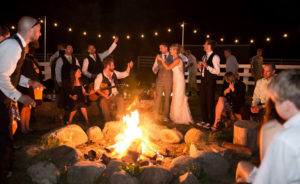If You Do Not Come Too Close
More from East Coker by T. S. Eliot winner of the Nobel prize for literature…
In that open field
If you do not come too close, if you do not come too close,
On a summer midnight, you can hear the music
Of the weak pipe and the little drum
And see them dancing around the bonfire
The association of man and woman
In daunsinge, signifying matrimonie—
A dignified and commodiois sacrament.
Two and two, necessarye coniunction,
Holding eche other by the hand or the arm
Whiche betokeneth concorde. Round and round the fire
Leaping through the flames, or joined in circles,
Rustically solemn or in rustic laughter
Lifting heavy feet in clumsy shoes,
Earth feet, loam feet, lifted in country mirth
Mirth of those long since under earth
Nourishing the corn. Keeping time,
Keeping the rhythm in their dancing
As in their living in the living seasons
The time of the seasons and the constellations
The time of milking and the time of harvest
The time of the coupling of man and woman
And that of beasts. Feet rising and falling.
Eating and drinking. Dung and death.
Dawn points, and another day
Prepares for heat and silence. Out at sea the dawn wind
Wrinkles and slides. I am here
Or there, or elsewhere. In my beginning.
Why do I like these lines?
The description is counterpoint to the invasive, everything-for-sale to the highest bidder (especially personal information), the bureaucraticly-entangled time in which we live.
 There are aspects of life that are priceless, not amenable to a market equivalence. These can be understood/appreciated as long as one maintains distance as reverent observer. There is an intimate dimension to every persons life, and especially the relationship between life-long partners joined in marriage. I like the allusion which the poet makes to preceding generations by his use of old Elizabethan verbiage describing the rural scene of an outdoor wedding celebration. The “tactile” touch of male and female joined by the ancient ritual of matrimony is linked in solidarity with the community as a wider circle of neighbors circle the bonfire, holding hands in dance. Beautiful and profound.
There are aspects of life that are priceless, not amenable to a market equivalence. These can be understood/appreciated as long as one maintains distance as reverent observer. There is an intimate dimension to every persons life, and especially the relationship between life-long partners joined in marriage. I like the allusion which the poet makes to preceding generations by his use of old Elizabethan verbiage describing the rural scene of an outdoor wedding celebration. The “tactile” touch of male and female joined by the ancient ritual of matrimony is linked in solidarity with the community as a wider circle of neighbors circle the bonfire, holding hands in dance. Beautiful and profound.
Finally, there’s the pointed reference to the ancient rhythms of Nature, the animals and their care, and yes, dung and death. Everything, all of it matters, and nothing externalized as toxic waste, to the rhythmic circle.
In the final segment of four lines the poet seems to catch his breath, steps out of the reverie. Another day and another beginning. He looks out to sea and thinks, “Well, here I am, — it is time to begin again…”